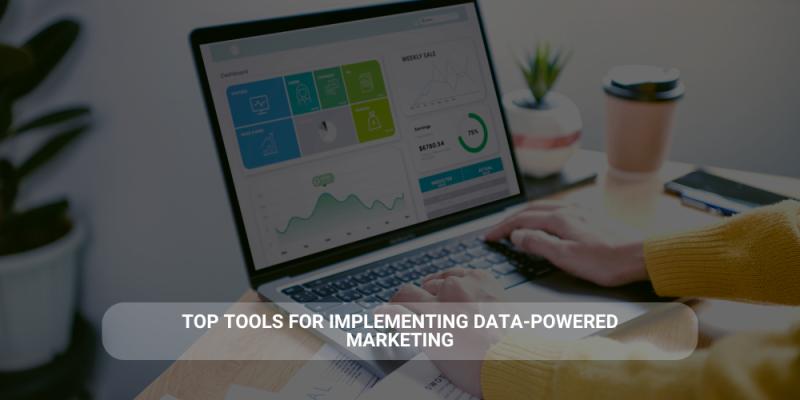Top Tools for Implementing Data-Powered Marketing

In today's fast-evolving digital landscape, Data-Powered Marketing has emerged as a cornerstone for effective marketing
strategies. By leveraging data analytics and insights, businesses can craft
personalized experiences that resonate with their target audiences. This tech article explores the top tools and strategies for implementing data-powered
marketing, ensuring your campaigns are not only effective but also efficient.
Understanding Data-Powered Marketing
Data-Powered Marketing refers to the use of data
to inform and optimize marketing strategies. This approach allows businesses to
understand customer behavior, preferences, and trends, enabling them to create
targeted campaigns that yield higher returns on investment (ROI). The shift
from traditional marketing methods to data-driven strategies is essential in a
world where consumers are inundated with information.
Key Benefits of Data-Powered Marketing
- Enhanced
Customer Insights: Data enables marketers to gain deep insights into
customer preferences and behaviors. By analyzing this information,
businesses can tailor their offerings to meet specific needs, leading to
increased customer satisfaction and loyalty
- Improved
Targeting: With data analytics, marketers can identify and segment
their audience more effectively. This precision targeting ensures that
marketing messages reach the right people at the right time, significantly
improving engagement rates
- Real-Time
Adaptation: One of the most significant advantages of data-powered
marketing is the ability to adapt strategies in real-time. Continuous data
collection allows marketers to tweak their campaigns based on performance
metrics, ensuring they remain relevant in a fast-paced environmentTop
Tools for Implementing Data-Powered Marketing
To effectively harness the power of data in your marketing
efforts, consider integrating the following tools into your strategy:
1. Customer Relationship Management (CRM) Systems
CRMs like Salesforce or HubSpot provide valuable insights
into customer interactions and behaviors. These platforms help businesses track
leads, manage customer relationships, and analyze sales data, allowing for more
informed decision-making.
2. Analytics Platforms
Tools such as Google Analytics and Adobe Analytics offer
comprehensive insights into website performance and user behavior. They enable
marketers to monitor traffic sources, user engagement, and conversion rates,
helping refine marketing strategies based on actual data.
3. Marketing Automation Software
Platforms like Marketo or Mailchimp allow for automated
email campaigns based on user behavior and preferences. By segmenting audiences
and personalizing content, businesses can enhance engagement and drive
conversions more effectively.
4. Social Media Analytics Tools
Tools such as Hootsuite or Sprout Social provide insights
into social media performance. These platforms track engagement metrics,
audience demographics, and content performance across various channels, helping
marketers optimize their social media strategies.
5. Predictive Analytics Tools
Predictive analytics tools like IBM Watson or SAS enable
businesses to forecast future trends based on historical data. By analyzing
patterns in consumer behavior, companies can anticipate needs and tailor their
marketing efforts accordingly
Strategies for Effective Data-Powered Marketing
Implementing data-powered marketing requires a strategic
approach:
Define Clear Objectives
Establish key performance indicators (KPIs) that align with
your business goals. Whether it's increasing website traffic or boosting sales
conversions, having clear objectives will guide your data collection efforts.
Collect Relevant Data
Gather data from various sources such as website analytics,
social media platforms, and customer feedback. This comprehensive approach
ensures you have a well-rounded view of your audience's preferences and
behaviors
Utilize Segmentation
Segment your audience based on demographics, interests, or
purchase behavior. This allows for more personalized marketing messages that
resonate with specific groups
Test and Optimize
Regularly test different marketing strategies using A/B
testing methods. Analyze the results to identify what works best for your
audience and continuously optimize your campaigns for better performance
Leverage Martech Solutions
Incorporating martech (marketing technology) solutions can
streamline your data-driven efforts. These tools help automate processes,
analyze large datasets, and enhance overall efficiency in executing marketing
campaigns
Conclusion
The transition to Data-Powered Marketing is
not just a trend; it’s a necessity for businesses aiming to thrive in today’s
competitive landscape. By leveraging advanced tools and strategies grounded in
data analytics, companies can create personalized experiences that drive
engagement and boost ROI.As you embark on this journey toward a more
data-centric approach in your marketing efforts, remember that continuous
learning and adaptation are key. Embrace the power of data to not only meet but
exceed your customers' expectations—ensuring long-term success in an
ever-evolving market environment.
Comments